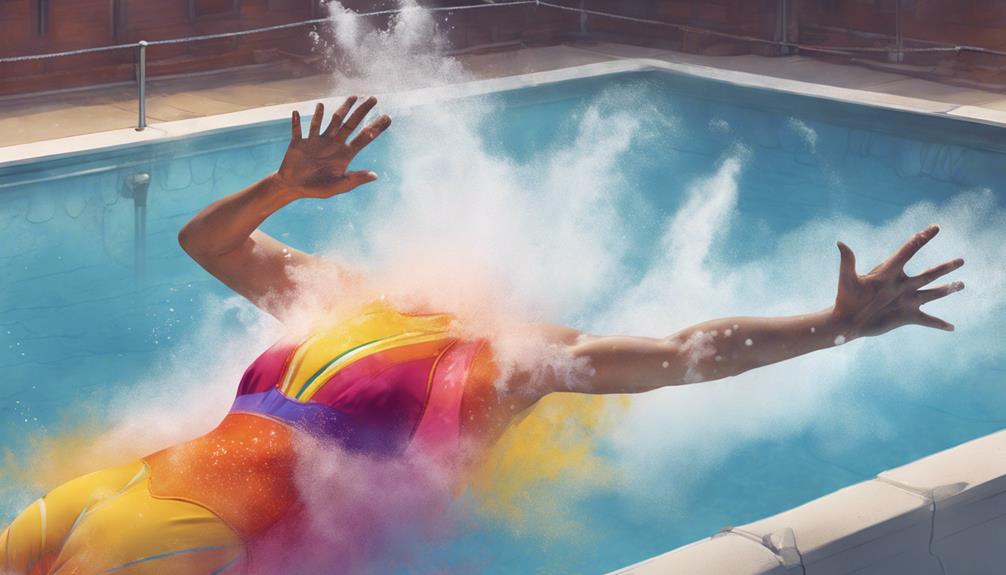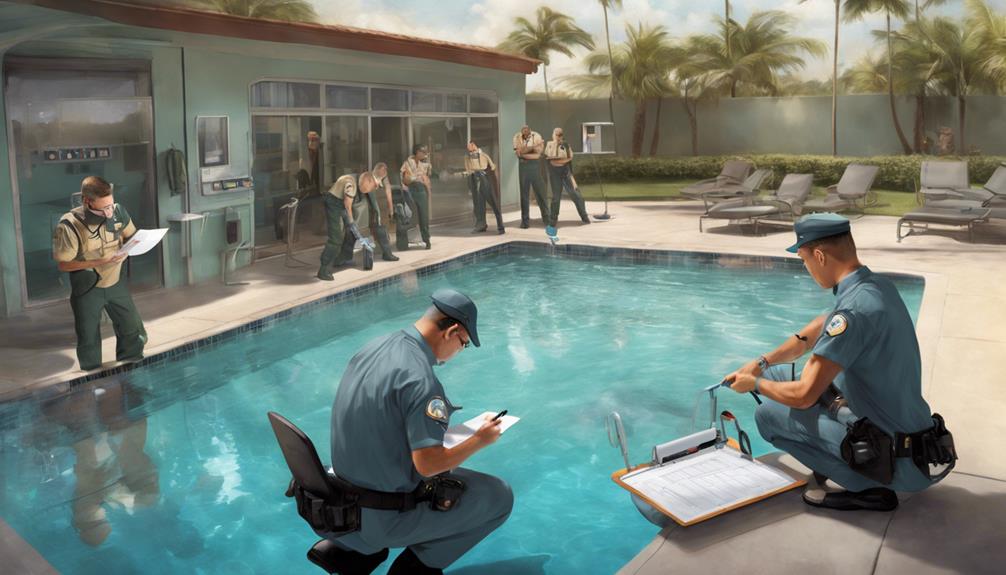In the debate between saltwater and chlorine pools, saltwater pools offer softer water that is gentler on the skin. However, they come with a higher initial cost and require specific equipment. Chlorine pools, on the other hand, are more common and cost-effective but may cause skin irritation. The best choice depends on personal preferences and financial factors. To make an informed decision, it is crucial to weigh the pros and cons of each type. Ultimately, selecting the right pool will depend on individual needs and maintenance capabilities. Finding a balance between these factors will lead to the most suitable pool option for a satisfying swimming experience.
Key Takeaways
- Saline pools offer softer water, less skin irritation, and are environmentally friendly.
- Chlorine pools are cost-effective, efficient in sanitization, and widely used.
- Consider individual preferences, budget, maintenance, and equipment investment.
- Saline pools require a specific generator, while chlorine pools need regular balancing.
- Choose the pool that best suits your needs based on the benefits and drawbacks.
Saline Pool Benefits
When considering the benefits of a saline pool, it becomes clear that this modern approach to chlorination offers numerous advantages over traditional chlorine pools. Saline pools require less maintenance, making them a cost-effective option in the long run.
The water in a saline pool is softer, reducing skin, hair, and eye irritation commonly associated with traditional chlorine pools. Additionally, the conversion of salt into chlorine through a chlorine generator is a gentler process that does not damage swimwear.
Saline pools are safer for swimmers and are considered more environmentally friendly due to the reduced need for harsh chemicals. However, operating a saline pool requires a specific salt chlorine generator to ensure proper function and maintenance.
Saline Pool Drawbacks
Moving beyond the advantages of a saline pool, it is important to acknowledge the potential drawbacks associated with this modern approach to pool chlorination. While saline pools offer numerous benefits, they also come with some notable drawbacks.
To start, the initial cost of setting up a saline pool is higher compared to traditional chlorine pools. Additionally, the complex operating system of a saline pool may require professional assistance for maintenance and repairs, adding to the overall cost.
In addition, although saltwater can be converted into chlorine through a generator, it does not effectively combat bacteria on its own. Also, the corrosive nature of saltwater can damage pool parts over time, requiring specific and potentially costly replacements for maintenance.
Chlorine Pool Benefits

One of the key advantages of a chlorine pool is its widespread use as the most common choice for maintaining pool water cleanliness. Chlorine pools offer lower electricity consumption and installation costs compared to saline pools. Additionally, finding maintenance help for chlorine pools is easier, making upkeep more convenient.
Chlorine serves as an efficient sanitizer that instantly kills germs in the water, ensuring a clean pool environment. Unlike saline pools, chlorine pools pose less risk of damaging pool parts due to their balanced chemical composition.
Chlorine Pool Drawbacks
Despite its popularity and effectiveness in sanitizing pool water, chlorine pools do come with certain drawbacks that potential pool owners should consider. One significant drawback is the potential for skin, hair, and eye irritation due to the harsh chemicals in chlorine.
Additionally, the strong smell of chlorine can be off-putting to some individuals. Another drawback is the regular maintenance required to keep chlorine levels balanced, which can be time-consuming and costly. Chlorine pools also have the potential to fade or damage swimwear over time.
Additionally, the presence of chlorine byproducts, such as chloramines, can lead to respiratory issues for swimmers. These factors should be carefully weighed when deciding between a chlorine pool and other alternatives.
The Winning Pool Choice

Considering the benefits and drawbacks of both saline and chlorine pools, making an informed decision on the winning pool choice involves a careful evaluation of factors such as maintenance, cost, safety, and overall pool experience.
Saline pools offer softer water, less skin irritation, and are more environmentally friendly but come with a higher initial cost and the need for specific equipment.
On the other hand, chlorine pools are cost-effective, efficient in sanitization, and require less maintenance but can potentially damage pool parts and may cause skin irritation.
Ultimately, the winning pool choice depends on individual preferences, budget constraints, and willingness to invest in maintenance and equipment for a pool that best suits one's needs.
Frequently Asked Questions
Can I Switch From a Chlorine Pool to a Saline Pool?
Yes, you can switch from a chlorine pool to a saline pool. Consider the initial cost, operating system complexity, and need for specific equipment. Guarantee proper installation of a salt chlorine generator. Professional assistance may be necessary.
How Often Do I Need to Add Salt to a Saline Pool?
Salt replenishment in a saline pool is imperative to maintain ideal chlorine levels. Depending on usage, climate, and water balance, salt may need to be added every 3-6 months. Regular testing and adjustment are key.
Are Saline Pools Suitable for Individuals With Sensitive Skin?
Saline pools, due to their softer water and reduced irritation properties, are suitable for individuals with sensitive skin. The conversion of salt to chlorine through a generator provides a gentler swimming experience, offering a viable option for skin sensitivity concerns.
Do Saline Pools Have a Unique Taste Compared to Chlorine Pools?
Saline pools may have a unique taste compared to chlorine pools due to the salt content. Some swimmers find the slight saltiness pleasant, while others prefer the neutrality of chlorine. Taste preferences vary among individuals.
Can I Use Regular Pool Chemicals in a Saline Pool?
Traditional pool chemicals may not be suitable for use in a saline pool due to the specific requirements of the saltwater system. It is recommended to utilize products designed for saline pools to guarantee proper maintenance and operation.
Which is a Better Option for Pool Sanitization: Chlorine or Bromine?
When it comes to the chemical pool battle: chlorine vs bromine, both options have their advantages. Chlorine is a more popular choice for its effectiveness in killing bacteria and algae. On the other hand, bromine is known for its stability in higher temperatures and pH levels. Ultimately, the choice depends on your specific pool needs.
Which is better for pool maintenance, chlorine or bromine?
When it comes to pool maintenance, the chemical showdown: chlorine battles bromine. Both chemicals are effective in disinfecting the pool water and killing bacteria and algae. Chlorine is more commonly used and cost-effective, while bromine is gentler on the skin and better suited for indoor pools. It ultimately depends on your specific needs.
Which Is Better for Pool Sanitation: Chlorine or Bromine?
When it comes to the chemical battle for pools, the choice between chlorine and bromine for sanitation depends on various factors. Chlorine is faster-acting and better for large pools, while bromine is more stable at higher temperatures and better for hot tubs. Ultimately, the decision should be based on pool size and usage.
Which is Better for Pool Maintenance: Chlorine or Bromine?
When it comes to the chemical pool battle: chlorine vs bromine, both have their advantages. Chlorine is popular for its effectiveness in killing bacteria and algae, while bromine is known for being more stable in higher temperatures and pH levels. Ultimately, the choice depends on your specific pool needs and preferences.
What are the benefits of using a chlorinator in a saltwater pool?
Using a chlorinator for pool maintenance in a saltwater pool offers numerous benefits. It efficiently and effectively sanitizes the water, eliminating the need for manual chlorination. This reduces the time and effort required for pool upkeep, resulting in a more convenient and enjoyable swimming experience.
Conclusion
In the vast expanse of pool options, the battle between saltwater and chlorine pools rages on. Like a serene oasis, saltwater pools offer a gentle embrace with softer water and reduced skin irritation.
Meanwhile, chlorine pools stand strong with their efficient sanitizing properties and cost-effective nature. Ultimately, the choice between these two pools is a personal one, dependent on individual preferences and needs.
Choose wisely, as your pool oasis awaits.









